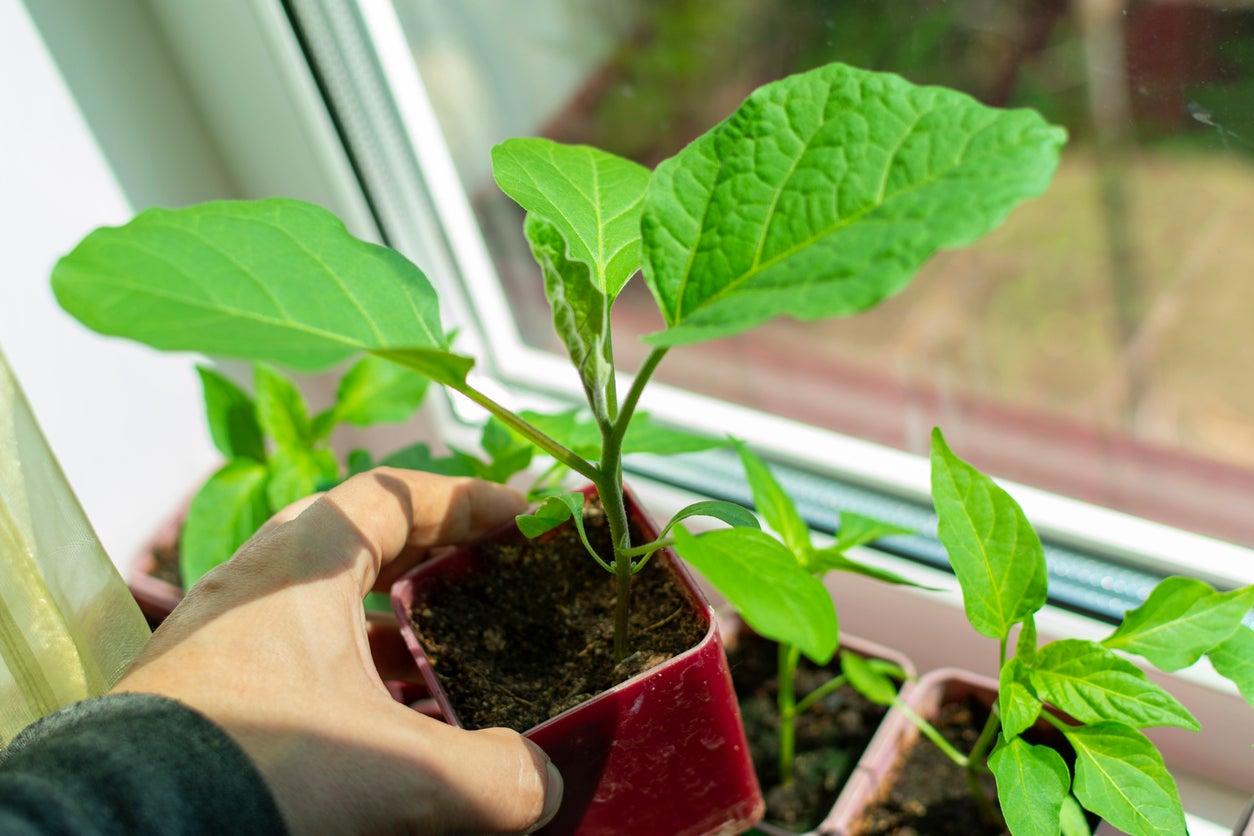Can You Grow Eggplants Indoors: Tips For Growing Eggplants Inside


The versatility and nutritional appeal of eggplants make them a perfect food for many recipes. These heat loving veggies need a long growing season and plenty of sunshine. Can you grow eggplants indoors? It will be a bit tricky and requires some extra attention compared to garden grown plants, but it can be done. Keep reading for some tips on indoor eggplants and the secret to getting them to fruit.
Can You Grow Eggplants Indoors?
Some people call them aubergines, but by any name eggplants are a dining treat. Growing eggplants inside is a bit tricky because it is difficult to provide enough heat and candle hours of light. The obvious solution is to build a grow system that not only enhances heat but includes grow lights. It still might not result in fruit, but you will have an elegant eggplant as a houseplant.
Eggplants are in the same family as peppers and tomatoes, the nightshade family. When growing eggplants inside, be cautious that curious animals and small children won't try to nibble on the foliage, which is toxic. Select one of the smaller eggplant varieties due to space restrictions.
Growing Eggplants Inside
The first condition to tackle is heat. Eggplants germinate at 70 degrees F. (21 C.) or higher. You will really have to turn up the heat and probably use a heat mat to get sprouts. During the plant's development, that high temperature must be maintained. Amping up the heat at least 10 more degrees will help the plant set blooms and fruit.
Even with a southern window, it is going to be hard to provide adequate light. Use grow lights to give the plants at least eight to ten hours of full sun. High output T5 lights will provide enough light and produce a bit of heat too. Overhead lighting is sufficient for initial growth.
For best results, add peripheral lights once the plant starts to flower. This will help drive fruit production by allowing light to reach under the leaves and go directly towards the flowers and fruit. To keep the heat and lights confined, use a grow tent. This will focus the light and keep the temperatures high. Keep plants moist and encourage humidity.
Pollination and Fruit Set for Indoor Eggplants
Eggplants are self-pollinating, but they rely upon the wind and insect activity to move pollen to flowers. Having an eggplant as a houseplant means you have to hand pollinate. Shaking the plant will help stir up pollen but a more direct method will work best. Use a small paint brush or cotton swab and swizzle it around each flower, dispensing pollen as you go.
Gardening tips, videos, info and more delivered right to your inbox!
Sign up for the Gardening Know How newsletter today and receive a free copy of our e-book "How to Grow Delicious Tomatoes".
Fruiting will stop if temperatures get over 95 degrees F. (35 C.), so you will need to watch the heat.
Eggplants need to be kept evenly moist with humidity around 65 to 75 percent. Fertilize when plants begin to flower with a good tomato food.
Aphids and spider mites are the most common pests which can be combated by rinsing them off or using horticultural oil.
With a bit of extra work, growing eggplants inside is possible, and you can expect some fruit with good care.

Bonnie Grant is a professional landscaper with a Certification in Urban Gardening. She has been gardening and writing for 15 years. A former professional chef, she has a passion for edible landscaping.
-
 Looking For Plants To Give You The Soft And Fuzzies? Try These 5 Fuzzy Leaf Plant Options
Looking For Plants To Give You The Soft And Fuzzies? Try These 5 Fuzzy Leaf Plant OptionsLovers of texture, drama, silver foliage and tactile plants will adore these special sensory garden additions. These fuzzy leaf plant options will leave you all aglow
By Susan Albert
-
 Get Ready For A Summer Of Hummers! Grow These Full Sun Hummingbird Plants and Flowers
Get Ready For A Summer Of Hummers! Grow These Full Sun Hummingbird Plants and FlowersIf you’re lucky enough to enjoy a sunny backyard, make sure you are maxing out on your pollinator opportunities and grow these full sun hummingbird plants and flowers
By Tonya Barnett